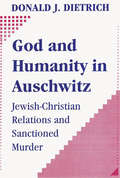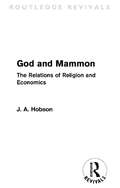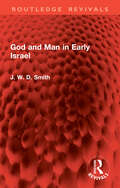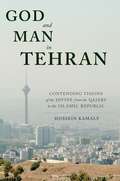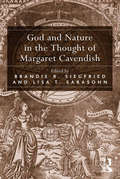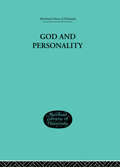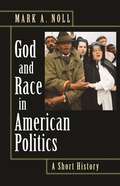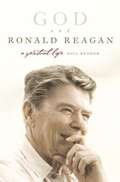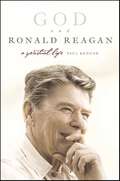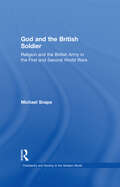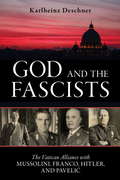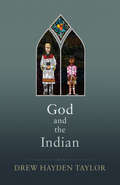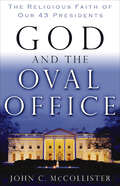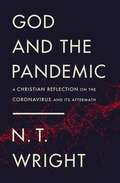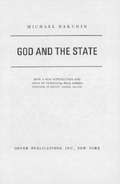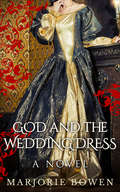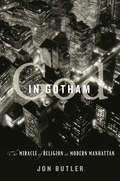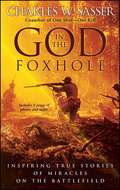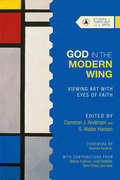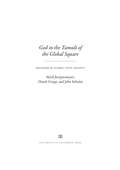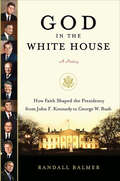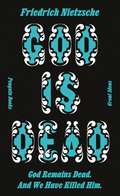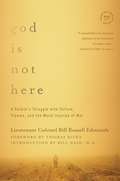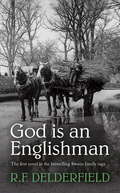- Table View
- List View
God and Humanity in Auschwitz: Jewish-Christian Relations and Sanctioned Murder
by Donald DietrichGod and Humanity in Auschwitz synthesizes the findings of research developed over the last thirty years on the rise of anti-Semitism in our civilization. Donald J. Dietrich sees the Holocaust as a case study of how prejudice has been theologically enculturated. He suggests how it may be controlled by reducing aggressive energy before it becomes overwhelming. Dietrich studies the recent responses of Christian theologians to the Holocaust and the Jewish theological response to questions concerning God's covenant with Israel, which were provoked by Auschwitz.Social science has dealt with the psychosocial dynamics that have supported genocide and helps explain how ordinary persons can produce extraordinary evil. Dietrich shows how this research, combined with theological analyses, can help reconfigure theology itself. Such an approach may serve to help dissolve anti-Semitism, to aid in constructing such positive values as respect for human dignity, and to point the way to restricting future outbreaks of genocide.God and Humanity in Auschwitz surveys which religious factors created a climate that permitted the Holocaust. It also illuminates what social science has to tell us about developing a strategy that, when institutionally implemented, can channel our energies away from sanctioned murder toward a more compassionate society. The book has proven to be an essential resource for theologians, sociologists, historians, and political theorists.
God and Mammon: The Relations of Religion and Economics (Routledge Revivals)
by J. A. HobsonFirst published in 1931, this is an attempt by the great economist J. A. Hobson to analyse the relations between economics and religion. After considering the origins of the conflicts and compromises between God and Mammon in the life of primitive man, the author concerns himself primarily with medieval and modern Christianity and the business climate and ethos corresponding with these periods. In particular he focuses upon Catholicism and Protestantism, before considering the attitude of the church towards modern economic movements.
God and Man in Early Israel (Routledge Revivals)
by J. W. SmithFirst published in 1956, God and Man in Early Israel deals with Old Testament history from Abraham to Solomon in the light of modern archaeological research and biblical scholarship, and in terms of the Christian belief in divine revelation. The book is divided into three parts—God and Man in the stories of the Patriarchs; God and Man in the making of a Nation; and God and Man in the founding of a Kingdom. Biblical references are given throughout the book. God and Man in Early Israel is intended as a companion to the study of the Bible, not as a substitute for it. It will be a fascinating read for students and researchers of religion, history, and classics.
God and Man in Tehran: Contending Visions of the Divine from the Qajars to the Islamic Republic
by Hossein KamalyIn God and Man in Tehran, Hossein Kamaly explores the historical processes that have made and unmade contending visions of God in Iran’s capital throughout the past two hundred years. Kamaly examines how ideas of God have been mobilized, contested, and transformed, emphasizing how notions of the divine have given shape to and in turn have been shaped by divergent conceptualizations of nature, reason, law, morality, and authority.The book analyzes official government policies, modern textbooks, and university curricula; popular beliefs and ritual practices; and philosophical and juridical attitudes toward theological questions in traditional institutions. Kamaly considers continuity and change in religiosity under the Qajar and Pahlavi dynasties; the significance of outbreaks of messianic expectations; why a modernizing nation took a sudden turn toward state religiosity; and how the Islamic Republic deploys visions of God against foreign enemies and domestic critics. Beyond the majority Shia Muslim population, the book includes minority and suppressed voices. With a focus on the diversity of ideas of the divine, God and Man in Tehran offers a novel perspective on the intellectual movements that have shaped Iranian modernity.
God and Nature in the Thought of Margaret Cavendish
by Lisa T. Sarasohn Brandie R. SiegfriedOnly recently have scholars begun to note Margaret Cavendish’s references to 'God,' 'spirits,' and the 'rational soul,' and little has been published in this regard. This volume addresses that scarcity by taking up the theological threads woven into Cavendish’s ideas about nature, matter, magic, governance, and social relations, with special attention given to Cavendish’s literary and philosophical works. Reflecting the lively state of Cavendish studies, God and Nature in the Thought of Margaret Cavendish allows for disagreements among the contributing authors, whose readings of Cavendish sometimes vary in significant ways; and it encourages further exploration of the theological elements evident in her literary and philosophical works. Despite the diversity of thought developed here, several significant points of convergence establish a foundation for future work on Cavendish’s vision of nature, philosophy, and God. The chapters collected here enhance our understanding of the intriguing-and sometimes brilliant-contributions Cavendish made to debates about God’s place in the scientific cosmos.
God and Personality
by Clement C.J. WebbFirst published in 2002. This is Volume VII of seven in the Library of Philosophy series on the Philosophy of Religion. This volume is a collection of 10 Gifford lectures delivered at the University of Aberdeen in the years of 1918 and 1919 on the topic of God and personality.
God and Race in American Politics: A Short History
by Mark A. NollReligion has been a powerful political force throughout American history. When race enters the mix the results have been some of our greatest triumphs as a nation--and some of our most shameful failures. In this important book, Mark Noll, one of the most influential historians of American religion writing today, traces the explosive political effects of the religious intermingling with race. Noll demonstrates how supporters and opponents of slavery and segregation drew equally on the Bible to justify the morality of their positions. He shows how a common evangelical heritage supported Jim Crow discrimination and contributed powerfully to the black theology of liberation preached by Martin Luther King Jr. In probing such connections, Noll takes readers from the 1830 slave revolt of Nat Turner through Reconstruction and the long Jim Crow era, from the civil rights movement of the 1950s and 1960s to "values" voting in recent presidential elections. He argues that the greatest transformations in American political history, from the Civil War through the civil rights revolution and beyond, constitute an interconnected narrative in which opposing appeals to Biblical truth gave rise to often-contradictory religious and moral complexities. And he shows how this heritage remains alive today in controversies surrounding stem-cell research and abortion as well as civil rights reform. God and Race in American Politics is a panoramic history that reveals the profound role of religion in American political history and in American discourse on race and social justice.
God and Ronald Reagan: A Spiritual Life
by Paul KengorIn this groundbreaking book, political historian Paul Kengor draws upon Reagan's legacy of speeches and correspondence, and the memories of those who knew him well, to reveal a man whose Christian faith remained deep and consistent throughout his more than six decades in public life.
God and Ronald Reagan: A Spiritual Life
by Paul KengorRonald Reagan is hailed today for a presidency that restored optimism to America, engendered years of economic prosperity, and helped bring about the fall of the Soviet Union. Yet until now little attention has been paid to the role Reagan's personal spirituality played in his political career, shaping his ideas, bolstering his resolve, and ultimately compelling him to confront the brutal -- and, not coincidentally, atheistic -- Soviet empire.In this groundbreaking book, political historian Paul Kengor draws upon Reagan's legacy of speeches and correspondence, and the memories of those who knew him well, to reveal a man whose Christian faith remained deep and consistent throughout his more than six decades in public life. Raised in the Disciples of Christ Church by a devout mother with a passionate missionary streak, Reagan embraced the church after reading a Christian novel at the age of eleven. A devoted Sunday-school teacher, he absorbed the church's model of "practical Christianity" and strived to achieve it in every stage of his life.But it was in his lifelong battle against communism -- first in Hollywood, then on the political stage -- that Reagan's Christian beliefs had their most profound effect. Appalled by the religious repression and state-mandated atheism of Bolshevik Marxism, Reagan felt called by a sense of personal mission to confront the USSR. Inspired by influences as diverse as C.S. Lewis, Whittaker Chambers, and Aleksandr Solzhenitsyn, he waged an openly spiritual campaign against communism, insisting that religious freedom was the bedrock of personal liberty. "The source of our strength in the quest for human freedom is not material, but spiritual," he said in his Evil Empire address. "And because it knows no limitation, it must terrify and ultimately triumph over those who would enslave their fellow man."From a church classroom in 1920s Dixon, Illinois, to his triumphant mission to Moscow in 1988, Ronald Reagan was both political leader and spiritual crusader. God and Ronald Reagan deepens immeasurably our understanding of how these twin missions shaped his presidency -- and changed the world.
God and the British Soldier: Religion and the British Army in the First and Second World Wars (Christianity and Society in the Modern World)
by Michael SnapeDrawing on a wealth of new material from military, ecclesiastical and secular civilian archives, Michael Snape presents a study of the experience of the officers and men of Britain’s vast citizen armies, and also of the numerous religious agencies which ministered to them. Historians of the First and Second World Wars have consistently underestimated the importance of religion in Britain during the war years, but this book shows that religion had much greater currency and influence in twentieth-century British society than has previously been realised. Snape argues that religion provided a key component of military morale and national identity in both the First and Second World Wars, and demonstrates that, contrary to accepted wisdom, Britain’s popular religious culture emerged intact and even strengthened as a result of the army’s experiences of war. The book covers such a range of disciplines, that students and scholars of military history, British history and Religion will all benefit from its purchase.
God and the Fascists
by Karlheinz DeschnerNow available in English for the first time, a controversial work that indicts the Vatican for its actions before and during World War II. In the decade preceding the outbreak of World War II, the Vatican made a devil's bargain with fascist leaders. Anticipating that their regimes would eliminate a common enemy--namely Marxist-Leninist communism--two popes essentially collaborated with Hitler, Mussolini, and the fascist dictators in Spain (Franco) and Croatia (Pavelić). This is the damning indictment of this well-researched polemic, which for almost five decades in Germany has sparked controversy, outrage, and furious debate. Now it is available in English for the first time. Many will dismiss Deschner--who himself was raised and educated in a pious Catholic tradition--as someone who is obsessed with exposing the failings of the church of his upbringing. But he has marshaled so many facts and presented them with such painstaking care that his accusations cannot easily be ignored. The sheer weight of the evidence that he has brought together in this book raises a host of questions about a powerful institution that continues to exercise political influence to this day.
God and the Indian
by Drew Hayden TaylorWhile panhandling outside a coffee shop, Johnny, a Cree woman, is shocked to recognize a face from her childhood, which was spent in a Native American boarding school. Desperate to hear him acknowledge the terrible abuse inflicted on her and other children at the school, Johnny follows Anglican assistant bishop George King to his office to confront him.Ojibway writer Drew Hayden Taylor is the author of twenty-one publications. Hailed by the Montreal Gazette as one of Canada's leading Native dramatists, he writes for the screen and the stage, and contributes regularly to national newspapers.
God and the Oval Office: The Religious Faith of Our 43 Presidents
by John C. McCollisterA look into how the temporary residents of the White House expressed the deepest of all human feelings—personal religious faith—in their own words.“We need to remember that the separation of church and state must never mean the separation of religious values from the lives of public servants.” —Lyndon B. Johnson“So help me God.” George Washington added those words to the presidential oath, and every president since has followed suit. Whether their faith was devout or doubted, heartfelt or pragmatic, John McCollister plumbs America’s strong and deep spiritual heritage, showing the fascinating and vital role faith played in the lives of each of our forty-three presidents:Thomas Jefferson’s “edited” version of the GospelsAbraham Lincoln’s unique approach to organized religionAndrew Johnson’s “secret” CatholicismJames Garfield’s personal sacrifice of the pulpit for the presidencyDwight Eisenhower’s trust in God’s sovereigntyRonald Reagan’s profound sense of forgivenessGeorge W. Bush’s unapologetic faith in Jesus ChristFrom George Washington to George W. Bush, most of our country’s chief executives have turned to God for assurance, guidance, and hope. Through what they learned in the Bible, bolstered by strength found in prayer, they have led America to become the greatest nation on earth. Timely and timeless, God and the Oval Office tells their story.
God and the Pandemic: A Christian Reflection on the Coronavirus and Its Aftermath
by N. T. WrightDiscover a different way of seeing and responding to the Coronavirus pandemic, an approach drawing on Scripture, Christian history, and the way of living, thinking, and praying revealed to us by Jesus.What are we supposed to think about the Coronavirus crisis?Some people think they know: "This is a sign of the End," they say. "It's all predicted in the book of Revelation."Others disagree but are equally clear: "This is a call to repent. God is judging the world and through this disease he's telling us to change."Some join in the chorus of blame and condemnation: "It's the fault of the Chinese, the government, the World Health Organization…"N. T. Wright examines these reactions to the virus and finds them wanting. Instead, he shows that a careful reading of the Bible and Christian history offers simple though profound answers to our many questions, including:What should be the Christian response?How should we think about God?How do we live in the present?Why should we lament?What should we learn about ourselves?How do we recover?Written by one of the world's foremost New Testament scholars, God and the Pandemic will serve as your guide to read the events of today through the light of Jesus' death and resurrection.
God and the State (Select Bibliographies Reprint Ser.)
by Michael BakuninA founder of modern philosophical anarchism presents a clear introduction to anarchist thought and a manifesto of atheism. Bakunin offers a mind-opening experience for even the most skeptical readers. This influential work denounces religion as a weapon of the state that must be smashed in the pursuit of the right to self-determination.
God and the Wedding Dress: A Novel
by Marjorie BowenThe prolific author of A Knight in Spain presents a gripping work of historical fiction set during the Great Plague of London. In a remote Derbyshire village, over three hundred years ago, a man tried to serve his God to the best of his belief . . . but at a terrible cost to himself and others. William Mompesson is the new rector of Eyam. He is young, handsome, and has a lovely family. Life is too easy in the countryside, as his wife and children enjoy his generous income and the apathetic locals do not require much spiritual guidance. Mompesson’s greatest daily challenge is for the souls of his parishoners, as paganism and the famous dissenter Thomas Stanley vie for the attention of the people. But he soon faces a great test as the Plague comes to town, possibly in the crate with his sister-in-law’s wedding dress from London. As his parishioners die one after another, Mompesson is witness to unbelievable horrors that test his faith in God—and inspirational acts of heroism and sacrifice. “A quieter, more reflective novel, as much about a man’s inner struggles as it is about the history surrounding him . . . A fascinating story.” —She Reads Novels
God in Gotham: The Miracle Of Religion In Modern Manhattan
by Jon ButlerA master historian traces the flourishing of organized religion in Manhattan between the 1880s and the 1960s, revealing how faith adapted and thrived in the supposed capital of American secularism.In Gilded Age Manhattan, Catholic, Jewish, and Protestant leaders agonized over the fate of traditional religious practice amid chaotic and multiplying pluralism. Massive immigration, the anonymity of urban life, and modernity’s rationalism, bureaucratization, and professionalization seemingly eviscerated the sense of religious community.Yet fears of religion’s demise were dramatically overblown. Jon Butler finds a spiritual hothouse in the supposed capital of American secularism. By the 1950s Manhattan was full of the sacred. Catholics, Jews, and Protestants peppered the borough with sanctuaries great and small. Manhattan became a center of religious publishing and broadcasting and was home to august spiritual reformers from Reinhold Niebuhr to Abraham Heschel, Dorothy Day, and Norman Vincent Peale. A host of white nontraditional groups met in midtown hotels, while black worshippers gathered in Harlem’s storefront churches. Though denied the ministry almost everywhere, women shaped the lived religion of congregations, founded missionary societies, and, in organizations such as the Zionist Hadassah, fused spirituality and political activism. And after 1945, when Manhattan’s young families rushed to New Jersey and Long Island’s booming suburbs, they recreated the religious institutions that had shaped their youth.God in Gotham portrays a city where people of faith engaged modernity rather than floundered in it. Far from the world of “disenchantment” that sociologist Max Weber bemoaned, modern Manhattan actually birthed an urban spiritual landscape of unparalleled breadth, suggesting that modernity enabled rather than crippled religion in America well into the 1960s.
God in the Foxhole: Inspiring True Stories of Miracles on the Battlefield
by Charles W. SasserFrom veteran military writer Charles Sasser comes a collection of inspiring personal accounts of American soldiers whose faith has guided them through the hardships of war.From the battlefields of the American Civil War through World Wars I and II, from Korea and Vietnam to the front lines in Iraq and Afghanistan, soldiers of all faiths have struggled for understanding and called on a higher power when faced with the realities of combat. God in the Foxhole is a stunning collection of true personal accounts from generations of American soldiers whose faith, in the words of author Charles W. Sasser, "has been born, reborn, tested, sustained, verified, or transformed under fire." A renowned master of combat journalism and a former Green Beret, Sasser has gathered an immensely moving collection of war stories like no other—stories of spirituality, conversion, and miracles from the battlefield. Be they Christian, Jewish, Muslim, or atheist, churched since childhood or touched by the divine for the first time, here are the riveting experiences of army privates, bomber pilots, navy lieutenants, marines, prisoners of war, medics, nurses, chaplains, and others who, under desperate circumstances and with every reason to fear for their lives, found unknown strength, courage, and heroism through their remarkable faith. These inspiring accounts transcend the explainable to become stunning portraits of survival and belief: the angelic vision that brought inner peace to an exhausted helicopter door gunner in Vietnam; the makeshift full-immersion baptisms of eleven soldiers on Palm Sunday in Iraq, 2004; two enemies—a Nazi priest and an American G.I.—who served Communion Mass in a Belgian sanctuary in 1944; the prescient letter from a Civil War army major to his beloved wife, one week before his death at Bull Run; the 21st-century toddler with a jaw-dropping spiritual connection to a war hero of Iwo Jima, and dozens more. A war chronicle like no other, God in the Foxhole affirms, for military buffs and readers from all walks of life, the power of faith in the face of adversity.
God in the Modern Wing: Viewing Art with Eyes of Faith (Studies in Theology and the Arts Series)
by G. Walter Hansen Cameron J. Anderson Cameron J. Anderson, G. Walter HansenShould Christians even bother with the modern wing at the art museum? After all, modern art and artists are often caricatured as rabidly opposed to God, the church—indeed, to faith of any kind. But is that all there is to the story? In this Studies in Theology and the Arts volume, coeditors Cameron J. Anderson and G. Walter Hansen gather the reflections of artists, art historians, and theologians who collectively offer a more complicated narrative of the history of modern art and its place in the Christian life. Here, readers will find insights on the work and faith of artists including Marc Chagall, Jackson Pollock, Mark Rothko, Andy Warhol, and more. For those willing to look with eyes of faith, they may just find that God is present in the modern wing too.
God in the Tumult of the Global Square: Religion in Global Civil Society
by Mark Juergensmeyer Dinah Griego John SoboslaiHow is religion changing in the twenty-first century? In the global era, religion has leapt onto the world stage, though often in contradictory ways. Some religious activists are antagonistic and engage in protests, violent acts, and political challenges. Others are positive and help to shape an emerging transnational civil society. A new global religion may be in the making, providing a moral and spiritual basis for a worldwide community of concern about environmental issues, human rights, and international peace. God in the Tumult of the Global Square explores all of these directions, based on a five-year Luce Foundation project that involved religious leaders, scholars, and public figures in workshops held in Cairo, Moscow, Delhi, Shanghai, Buenos Aires, and Santa Barbara. In this book, the voices of these religious observers around the world express both the hopes and fears about new forms of religion in the global age.
God in the White House: A History
by Randall Herbert BalmerHow did we go from John F. Kennedy declaring that religion should play no role in the elections to Bush saying, "I believe that God wants me to be president"?Historian Randall Balmer takes us on a tour of presidential religiosity in the last half of the twentieth century—from Kennedy's 1960 speech that proposed an almost absolute wall between American political and religious life to the soft religiosity of Lyndon B. Johnson's Great Society; from Richard Nixon's manipulation of religion to fit his own needs to Gerald Ford's quiet stoicism; from Jimmy Carter's introduction of evangelicalism into the mainstream to Ronald Reagan's co-option of the same group; from Bill Clinton's covert way of turning religion into a non-issue to George W. Bush's overt Christian messages, Balmer reveals the role religion has played in the personal and political lives of these American presidents.Americans were once content to disregard religion as a criterion for voting, as in most of the modern presidential elections before Jimmy Carter.But today's voters have come to expect candidates to fully disclose their religious views and to deeply illustrate their personal relationship to the Almighty. God in the White House explores the paradox of Americans' expectation that presidents should simultaneously trumpet their religious views and relationship to God while supporting the separation of church and state. Balmer tells the story of the politicization of religion in the last half of the twentieth century, as well as the "religionization" of our politics. He reflects on the implications of this shift, which have reverberated in both our religious and political worlds, and offers a new lens through which to see not only these extraordinary individuals, but also our current political situation.
God is Dead. God Remains Dead. And We Have Killed Him. (Penguin Great Ideas)
by Friedrich Nietzsche'We have left dry land and put out to sea! We have burned the bridge behind us - what is more, we have burned the land behind us!'Nietzsche's devastating demolition of religion would have seismic consequences for future generations. With God dead, he envisages a brilliant future for humanity: one in which individuals would at last be responsible for their destinies.One of twenty new books in the bestselling Penguin Great Ideas series. This new selection showcases a diverse list of thinkers who have helped shape our world today, from anarchists to stoics, feminists to prophets, satirists to Zen Buddhists.
God is Not Here: A Soldier's Struggle with Torture, Trauma, and the Moral Injuries of War
by Thomas Ricks Bill Nash Lieutenant Colonel Edmonds George LoberGod Is Not Here is a powerful and intimate look into torture and its effect on both the tortured and the torturer. In May of 2005, the U.S. government finally acknowledged that the invasion of Iraq had spawned an insurgency. With that admission, training the Iraqi Forces suddenly became a strategic priority. Lt. Col. Bill Edmonds, then a Special Forces captain, was in the first group of "official" military advisors. He arrived in Mosul in the wake of Abu Ghraib, at the height of the insurgency, and in the midst of America's rapidly failing war strategy. Edmonds' job was to advise an Iraqi intelligence officer--to assist and temper his interrogations--but not give orders. But he wanted to be more than a wallflower, so he immersed himself in the experience, even learning Arabic. In a makeshift basement prison, over countless nights and predawn hours, Edmonds came to empathize with Iraqi rules: do what's necessary, do what works. After all, Americans and Iraqis were dying. Edmonds wanted to make a difference. Yet the longer he submerged himself in the worst of humanity, the more conflicted and disillusioned he became, slowly losing faith in everything and everyone. In the end, he lost himself. He returned home with no visible wounds, but on the inside he was different. He tried to forget--to soldier on--but memories from war never just fade away... In God Is Not Here, the weight of history is everywhere, but the focus is on a young man struggling to learn what is right when fighting wrong. Edmonds provides a disturbing and thought-provoking account of the morally ambiguous choices faced when living with and fighting within a foreign religion and culture, as well as the resulting psychological and spiritual impacts on a soldier. Transcending the genre of the traditional war memoir, Edmonds' eloquent recounting makes for one of the most insightful and moving books to emerge from America's long war against terrorism.
God is an Englishman
by R. F. DelderfieldAdam Swann is hungry for success. He is one of the new breed of entrepreneurs thrown up by the Industrial Revolution, determined to take advantage of current economic conditions to build an unrivalled business empire. And he is determined to win the beautiful, strong-minded Henrietta, and persuade her to share in his struggles and triumphs.
God is an Englishman
by R. F. DelderfieldAdam Swann is hungry for success. He is one of the new breed of entrepreneurs thrown up by the Industrial Revolution, determined to take advantage of current economic conditions to build an unrivalled business empire. And he is determined to win the beautiful, strong-minded Henrietta, and persuade her to share in his struggles and triumphs.
